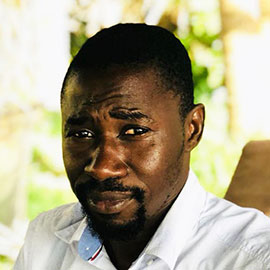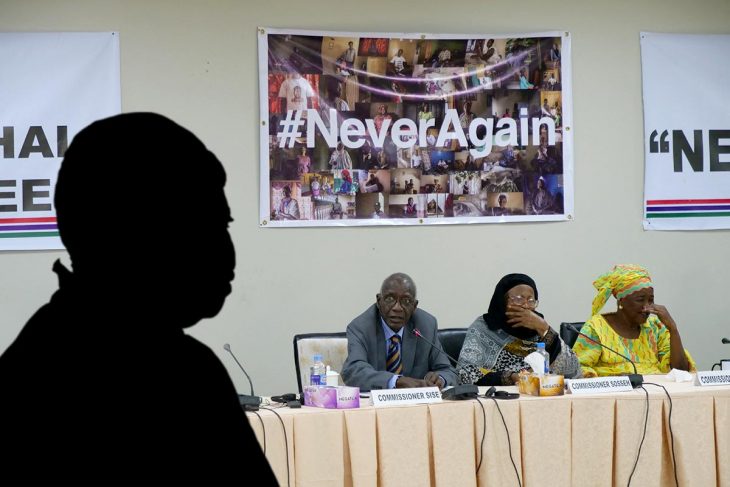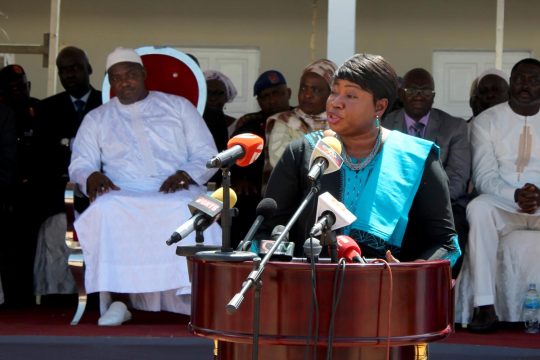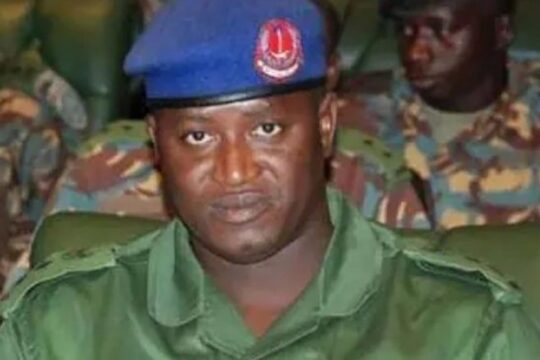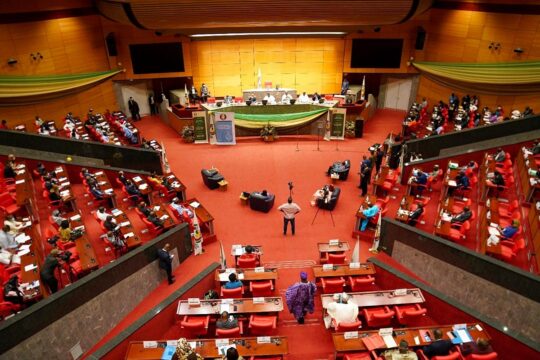Continuing the work started three weeks earlier on former ruler Yahya Jammeh’s judicial auxiliaries, Gambia’s Truth, Reconciliation and Reparations Commission (TRRC) continued to go back in time by confronting a selection of former Ministers of Justice, chosen from among the 18 appointed in twenty years of dictatorship.
In July 1994, when Jammeh took over the country, his junta accused the previous regime of “rampant corruption” and promised a new era of “probity” and “accountability”. But swiftly, dozens of former government officials, facing charges of graft, were arrested along with security officers who resisted the “revolution” or were suspected of counter-coup. There was little due process. To legitimize abuses, the military hired the services of Gambia’s legal minds. A plethora of decrees ensued, granting soldiers’ so-called Executive Council lawmaking and even judicial powers and making the courts unable to question their actions.
“It could have been worse”
One of Jammeh's long-lasting justice ministers was Joseph Henry Joof. He held the position from January 2001 to November 2003. Months before his nomination, Ebrima Barry, a student, was allegedly beaten to death by members of the Fire and Rescue Services. Shortly afterwards, a girl named Binta Manneh, a student athlete from Brikama Ba, was reportedly raped by a security officer. Students took to the street demanding justice. The repression of that demonstration would kill 14 of them, injuring dozens of others.
Joof sat in the inquiry Commission opened to investigate the events. Vital witnesses were not called, nor the command responsibility - which the TRRC established to have come from Jammeh. On April 26, Joof was in the hot seat before the Truth Commission:
- There is nowhere in the report where it is stated that the orders came from the President to shoot at the students, TRRC counsel Mariama Singhateh put to him.
- We were interested in the evidence… So, a lot of them said it was from above. They did not mention his name directly, said Joof.
- In simple terms, you are telling that you were just interested in those who shot the students and not those who gave orders?
- We set out to look into that, but the evidence was not sufficient…
In January 30, 2001, Jammeh appointed Joof as Justice Minister, thus making it his responsibility to advise on issues relating to his own inquiry. Joof said he drafted a cabinet paper requesting for the students to be compensated but the president objected. “He was misguided, because he felt that the armed forces did not do anything wrong,” said Joof. But at the same time, the same Joof went ahead to amend the 1982 Indemnity Act - to indemnify the security forces.
- Do you have any regrets? asked Commissioner Mustapha Kah.
- What? retorted Joof, who also claimed his human rights background.
- All these amendments including the Indemnity Act?
- I was very proud to serve my country… I was not serving Jammeh. If some of us did not get in there, it could have been worse… I never regretted that.
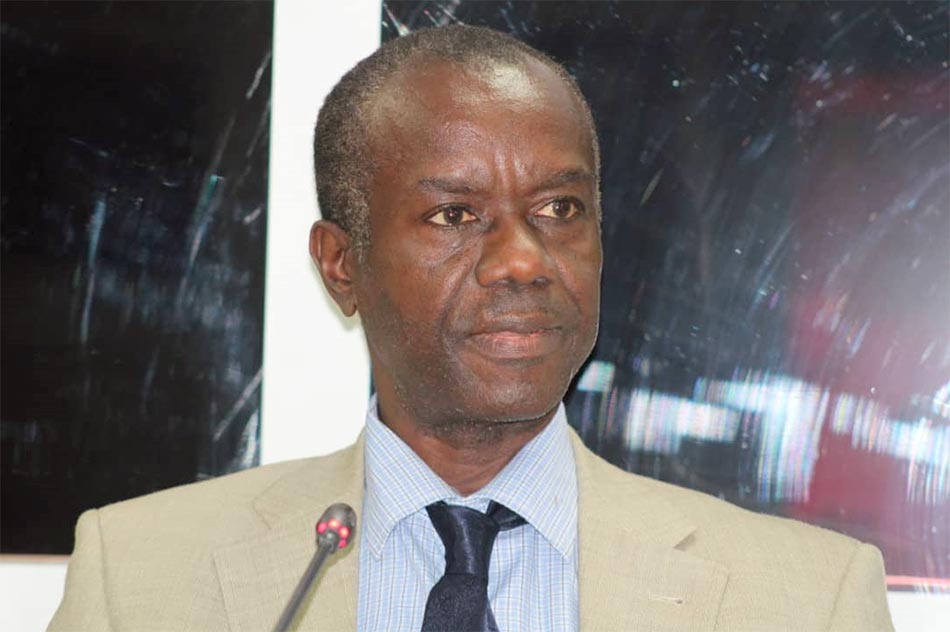
The Islamic republic
Mama Fatima Singhateh was Jammeh’s Justice Minister twice, from August 2013 to August 2014 and from January 2015 until the end of the regime, in December 2017. She was one of Jammeh’s few ministers who refused to abandon him. She was in charge when Jammeh decided to turn Gambia into an “Islamic state”, with no change in the laws and Constitution.
Singhateh testified on April 29, before a Truth Commission unconvinced by her claim that she advised Jammeh about the unconstitutionality of his declaration:
- It was your responsibility as the adviser to advise [Jammeh] according to the Supreme law of the land which is the constitution, observed TRRC Counsel Haddy Dandeh Jabbie.
- I hear you but what you should know is that even though I am the principal legal adviser, the President has many advisers. So, if my advice as a lawyer is in conflict with religious advice, knowing that this is what he wants, there is no way that he would accept my advice…
However at the time, despite major legal problems, Jammeh’s ministers including Singhateh were referring to the country as the “Islamic Republic of the Gambia”.
Singhateh was also in office when, in April, 2016, an opposition activist, Ebrima Solo Sandeng, disappeared in state custody. Members of the opposition United Democratic Party took to the street demanding his body “dead or alive”. Subsequently, several supporters were arrested and leaders put on trial. They were, documented the TRRC, denied bail for a bailable offence while their colleagues were reportedly brutalized in detention. Both the National Intelligence Agency, where Sandeng was reportedly killed, and Gambia’s High Court, where the trials took place, share fences with Singhateh’s office, but she appears to know little in that case.
- Weren’t they entitled to bail? asked TRRC Counsel Haddy Dandeh Jabbie.
- Of course, it is a bailable offence, is it not? replied Singhatey.
- Isn’t it correct that you advised the director of public prosecution to oppose bail?
- That is not true.
- That is the information we have.
- That is false information
- In any event, he did oppose bail even though it was a bailable offence.
- I am not aware of that…
- Gambia’s human rights records under you was poor, later commented counsel Jabbie.
- Most of the so-called violations that happened were not within my knowledge. It would have been nice for these things to be brought to my attention by my colleagues and so-called human rights defenders… I had an open-door policy,” retorted Singhatey.
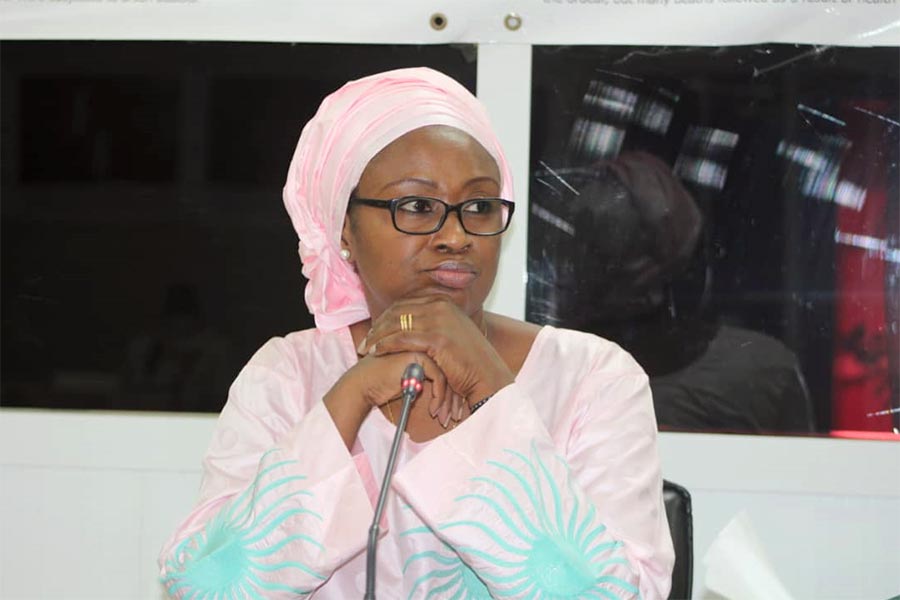
Bensouda, one of the ‘yes-women’
From very early on in Jammeh’s leadership, with first Minister of Justice Fafa Edrissa Mbai and first Solicitor General Amie Bensouda, to the last moments, with Singhatey, for Gambians Jammeh’s abuses would not have been possible without ‘yes-men’ or women at the Justice Ministry. But among his faithful servants, there may be those who have not yet been called or perhaps will never be called.
One of them is the current outgoing International Criminal Court prosecutor, Fatou Bensouda, who was Jammeh’s Justice Minister from July 1998 to March 2000 and has been accused of either involvement or knowledge of human rights violations. “I have no doubt that she has committed infractions and displayed biases in favor of her boss (Jammeh),” said Sidi Sanneh, a Gambian political and social commentator. Justice Info has gathered a new testimony alleging Bensouda’s judicial interference in a case that has been brought before the TRRC. It follows others that have been made public and which point in the same direction.
Lamin J. Darboe, who was a senior magistrate at Brikama Magistrate Court, told Justice Info that in 1999 four men came before him including the late Imam of Brikama Alhaji Karamo Touray, charged for allegedly demolishing a mosque. Evidence before the Commission showed that it was a typical Jammeh-era tactic to bring charges against innocent people or charge them in a wrong court, to justify an incarceration. The fact is that Imam Touray, known to be close to Jammeh’s most fierce opponent Ousainou Darboe, was being persecuted for his opinions.
In January, 2020, three people familiar with this saga including the Imam’s son Alfusainey Touray, detailed the case before the Truth Commission. Alfusainey was working for the National Intelligence Agency at the time. When the case was transferred to Brikama’s court, the Imam was already, with three others, in the infamous Mile 2 prison for eight months before Lamin Darboe acquitted and discharged him. “With a truckload of armed paramilitary personnel surrounding the Court premises, it was a dramatic day at Brikama,” Darboe told Justice Info.
Bensouda “called to protest my decision”
“Although terrified, I was clear about my responsibility as a judicial officer sworn on oath to impartially apply the laws of the Gambia.” However, Bensouda “called to protest my decision”, he said, and proceeded to report to the Chief Justice “who instructed the Judicial Secretary to oversee the dispute”. “The Judicial Secretary ordered an apology to the Minister [Bensouda] and I refused,” said Darboe in an interview with Justice Info on May 9.
“On the very next morning, I received a direct call from the Honourable Minister of Justice. She claimed my decision put her under a ‘lot of pressure’ and demanded information on why I acquitted and discharged the defendants. I told her to read the record. She demanded to know whether I even read the file, and yet again, I suggested she consult the record. Stunned, the Minister of Justice angrily demanded if I knew who I was talking to. With all due respect, I said, you know what to do if you don’t like my decision. She hung up!”
According to a 1999 report Amnesty International asked the government to “clarify the reasons for the arrests of the Imam and others in Brikama and to end their incommunicado detention. No response was received”. The first time Darboe went public with this information was 2012 when Bensouda reportedly told Aljazeera in an exclusive interview “quite frankly that my work as Justice Minister has never been interfered with”. But this apparently evaded the Truth Commission in their current hearings on judicial interference. “If (Mama Fatima) Singhateh was harassed over ideological and philosophical positions why not someone who directly interfered in a judicial process to the extent of threatening a magistrate?” asked Darboe to Justice Info.
Non-interference in a murder case
The outgoing prosecutor of the International Criminal Court served Jammeh as a justice minister and an attorney general from 31 July 1998 to March 2000. Prior to that, she was director of public prosecution in Banjul, by February 1994, five months before the coup d’état that brought Jammeh to power. She was 33 years old. This was a rather meteoric rise for this young lawyer during the Jammeh regime.
During that time, Batch Samba Jallow and Sainey Faye were arrested for reportedly protesting against the Junta before the American embassy. Jallow – who appeared before the Commission in January, 2019, and Faye who appeared February 2019 – both said they were wrongly accused and detained without enough evidence to prove their guilt, as Justice Info reported last year.
As well as abusing due process and the law, the TRRC has documented how Jammeh used the security forces to maim and kill, often in his own inner circle. Such was the case in January 2000, two months before Bensouda left office, when Lt. Almamo Manneh, a soldier perceived to be close to Jammeh and implicated in 1995 in the torture of political detainees, was allegedly killed by Ousman Sonko, a former Interior Minister currently in pre-trial detention in Switzerland, and others. According to Lalo Jaiteh, a former bodyguard who appeared before the TRRC in September 2019, Manneh was murdered in cold blood.
Justice Minister Bensouda took no public action in relation to this matter. Manneh’s body was not restituted to his family for burial and no one was held accountable for the murder. He was reportedly buried at Yundum barracks but the Truth Commission’s exhumation team couldn’t find his body.
Ongoing press freedom violations
The ex-minister has also been accused of failing to act over violations of human rights and press freedom during her two-year mandate. In January 1999, almost six months after Bensouda was appointed, Amnesty International summed upGambia’s human rights records in these few sentences: “At least 20 prisoners of conscience were held for short periods. At least three prisoners were reportedly tortured. Three military prisoners were sentenced to death. There were no investigations into past human rights violations.”
There were also a number of press freedom violations that year and the next. In February 1998, Boubacar Gaye and Ebrima Sillah, two journalists of the radio station Citizen FM, were arrested. The following day Citizen FM was shut down and deprived of its licence. In late August, when Bensouda was minister, the court ruled that Citizen FM would remain closed and fined the two men for "operating a radio station without licence". The radio remained close throughout 1999. Then the government lawyers failed to turn up in court and a new magistrate was appointed to hear the case, which prolonged the radio’s closure.
The Ministry of Justice, under Bensouda, also ordered The Independent newspaper to cease operations for failing to register its business name with the Commissioner of Income Tax. When the managing editor, Alagi Yorro Jallow, tried to pay the registration fee on 27 July 1999, he was told that the Commissioner of Income Tax had been ordered not to accept his payment.
In June, a month before Bensouda’s appointment, a Nigerian freelance journalist with the Daily Observer was detained and deported from the Gambia. According to Amnesty International, until March 1999, immigration officers conducted open surveillance of The Daily Observer, in a policy of intimidation aimed at non-Gambian journalists. In August, after her appointment, the editor of Daily Observer Demba Ali Jawo, who was the President of the Gambia Press Union, and his managing director Theophilus George were arrested and detained for two days.
Their arrests followed the publication of an article which the government claimed threatened security, about a wall that collapsed at President Yahya Jammeh's residence, revealing military equipment. These violations, and many more, were presented before the Truth Commission by the Gambia Press Union Secretary General Saikou Jammeh in July 2019.
The chances that Gambians will hear Bensouda shed light on these events is dwindling. The TRRC hearings have entered their final phase, with the commission expected to submit its final report to the country’s president in July.

